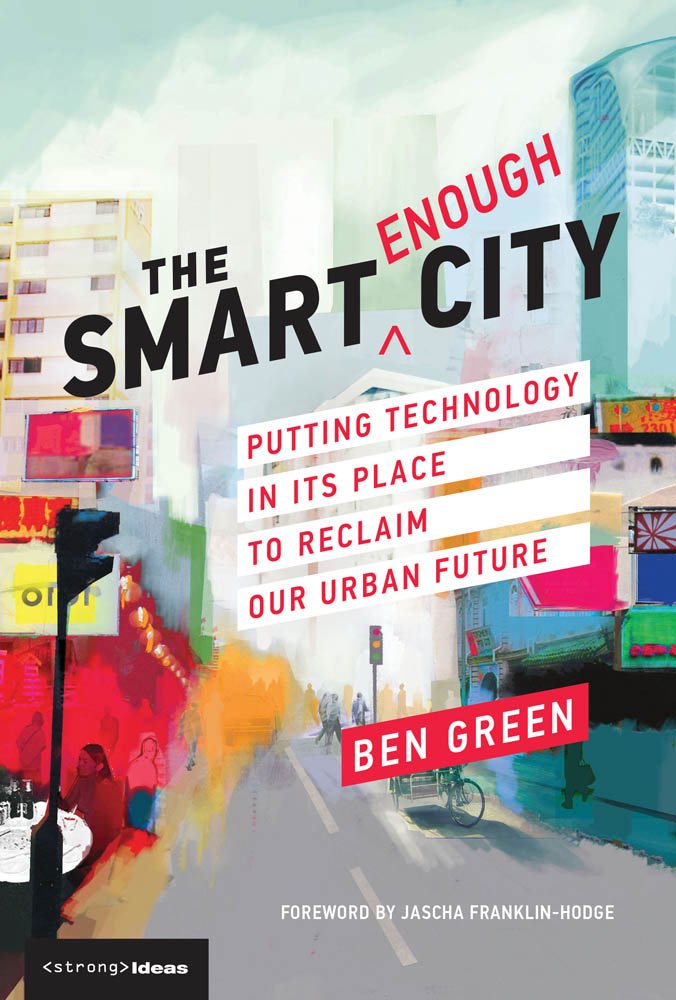The Smart Enough City
Order the book: MIT Press | Amazon | IndieBound | Barnes & Noble
Read the open access edition: MIT Press Direct | PubPub

Why technology is not an end in itself, and how cities can be “smart enough,” using technology to promote democracy and equity.
Smart cities, where technology is used to solve every problem, are hailed as futuristic urban utopias. We are promised that apps, algorithms, and artificial intelligence will relieve congestion, restore democracy, prevent crime, and improve public services. In The Smart Enough City, Ben Green warns against seeing the city only through the lens of technology; taking an exclusively technical view of urban life will lead to cities that appear smart but under the surface are rife with injustice and inequality. He proposes instead that cities strive to be “smart enough”: to embrace technology as a powerful tool when used in conjunction with other forms of social change — but not to value technology as an end in itself.
Excerpts/Op-eds
Smile, Your City Is Watching You (The New York Times)
The Biggest Mistakes Cities Make in Their Quest to Be Smart (Wall Street Journal)
Can predictive policing help stamp out racial profiling? (Boston Globe Magazine)
Cities Are Not Technology Problems: What Smart Cities Companies Get Wrong (Metropolis Magazine)
Reviews/Q+As
The Sins of “Smart” Cities (Boston Review)
The allure of technology into the “utopia” of the Smart City (Tapuya journal)
Can Smart Cities Be Equitable Cities? (Public Books)
Cities Too Smart for Their Own Good? (Harvard Magazine)
Putting technology in its place in the ‘smart enough’ city (Bloomberg Cities)
‘Smart city’ technology alone cannot solve social problems (StateScoop)
The Smart Enough City: Avoiding the Myopia of Tech Goggles (Stephen Few blog)
Move Carefully and Test Things (City as a Service)
A Talk with Smart City Skeptic, Ben Green (RedTail)
The “Smart Enough” City (Harvard Law Today)
Towards politically smart cities (InternetActu.net)
Out and about in London this weekend? Chances are you’re probably being tracked (The Evening Standard)
Interview on Techtonic with Mark Hurst (July 6, 2020)
In conversation: Ben Green on Smart (Enough) Cities (Current Affairs Podcast)
A More Inclusive Approach to Smart Cities (WashingTech Tech Policy Podcast)
Podcast: Take off your tech goggles, with Ben Green, author of The Smart Enough City (SmartCitiesWorld)
Advance Praise
Green’s book is a deeply thoughtful, thoroughly ethical, and technically precise account of how big data, AI, and machine learning can promote more efficient and livable cities without sacrificing civil liberties or serendipity. Green rightly argues that the stakes of “smart city” plans are high: we could sleepwalk into data infrastructures as tangled and self-defeating as the car cultures dominating contemporary American urban life. His work is a must-read for those seeking democracy and inclusion in technological advance.
―Frank Pasquale, Professor of Law, University of Maryland; co-editor of Transparent Data Mining for Big and Small Data
From engaging with citizens to figure out what they need and why they don’t have it yet to designing systems where everyday lives are fully at the center of things, Green’s The Smart Enough City provides a new framework for social responsibility in tech not rooted in abstract ethical tenets but grown from practices he put to the test himself. A pithy treatise that offers concrete stepping-stones to course-correct the technophilic tendencies of city planners and power brokers pushing tech-centric solutionism.
―Mary L. Gray, Microsoft Research; School of Informatics, Computing and Engineering Faculty at Indiana University; Berkman Klein Center for Internet and Society Fellow at Harvard University; co-author of Ghost Work: How to Stop Silicon Valley from Building a New Global Underclass
Green’s vision of the ‘smart enough city’ offers an incisive critique of the limits of technology-driven urban design. He vividly illustrates why cities need to engage values and politics when talking about smart cities. Most importantly, Green gives a road map for ethical and democratically engaged innovation.
―Beth Coleman, Professor of Experimental Digital Media at University of Waterloo; Director, City as Platform lab
The Smart Enough City draws a path toward ‘cities of tomorrow’ that we might actually want to live in. It recognizes the potential pitfalls of the tech-mediated cityscape without ignoring its enormous potential to improve our lives.
―Jonathan Zittrain, George Bemis Professor of International Law and Professor of Computer Science, Harvard University
Amidst all the hype about what a smart city is, Ben Green recounts a cautionary tale about the limits to how technology can improve our cities by increasing our quality of life. His thesis that smart cities are really all about smart citizens is a message for our times.
―Michael Batty, Emeritus Professor of Planning, Centre for Advanced Spatial Analysis, University College London; author of The New Science of Cities and Inventing Future Cities